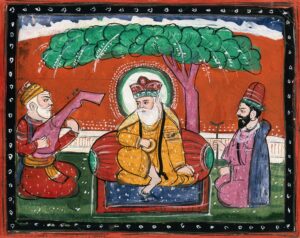Guru Gobind Singh Ji, the tenth and final human Guru of the Sikhs, was born on December 22, 1666, in Patna Sahib (now in Bihar, India). He was the only son of Guru Tegh Bahadur Ji, the ninth Guru, and Mata Gujri Ji. Born as Gobind Rai, he grew up surrounded by spiritual wisdom, courage, and sacrifice — values that would define his entire life. His early education included scripture, poetry, martial arts, archery, and horse riding, making him a scholar-warrior from a young age.
In 1675, at the age of just nine, Guru Gobind Singh Ji witnessed the martyrdom of his father, Guru Tegh Bahadur Ji, who was executed in Delhi for defending the religious freedom of Hindus against forced conversion by Emperor Aurangzeb. This tragic event marked a profound moment in Sikh history. Soon after, young Gobind Rai was formally anointed as the tenth Guru at Anandpur Sahib. Despite his youth, he immediately took on the responsibility of spiritual leadership and the protection of dharma (righteousness).
Guru Gobind Singh Ji’s leadership came during a time of great political and religious turmoil. He realized that the Sikh community needed to be spiritually strong and physically prepared to fight injustice. On Vaisakhi day in 1699, Guru Gobind Singh Ji created the Khalsa Panth, a turning point in Sikh history. Standing before thousands at Anandpur Sahib, he called for five volunteers willing to give their lives for faith. These five — Bhai Daya Singh, Bhai Dharam Singh, Bhai Himmat Singh, Bhai Mohkam Singh, and Bhai Sahib Singh — became the Panj Pyare (the Five Beloved Ones).
He initiated them into the Khalsa through Amrit Sanchar (baptism ceremony), giving them a new identity and the surname “Singh” (lion). Guru Ji himself then asked the Panj Pyare to initiate him, making him the first among equals — a powerful gesture that demonstrated equality and humility. He instructed the Khalsa to uphold justice, fearlessness, spiritual discipline, and purity, and to always wear the Five Ks (Kakkars):
Kesh – uncut hair
Kangha – wooden comb
Kara – iron bracelet
Kachera – cotton undergarments
Kirpan – ceremonial sword
Guru Gobind Singh Ji declared:
“When all other means fail, it is righteous to draw the sword.”
This was not a call for violence, but a call to stand against tyranny when all peaceful methods have been exhausted.
His life was full of battles fought in defense, including major conflicts at Anandpur Sahib, Chamkaur, and Muktsar against the Mughal empire and allied hill Rajas. Guru Ji suffered deep personal losses during these times. His elder sons, Ajit Singh and Jujhar Singh, were martyred in the Battle of Chamkaur, fighting bravely against overwhelming odds. His younger sons, Zorawar Singh and Fateh Singh, were bricked alive by the Nawab of Sirhind for refusing to convert to Islam — a sacrifice that is remembered with great reverence as Sahibzade Shaheedi.
Despite these painful losses, Guru Gobind Singh Ji remained unwavering in his mission. He continued to guide the Khalsa in spiritual and temporal matters and composed powerful literature that shaped Sikh philosophy. Among his most important works are:
Jaap Sahib
Akal Ustat
Bachittar Natak
Zafarnama – a poetic letter to Aurangzeb, in Persian, rebuking him for tyranny and deceit, yet upholding righteousness.
In 1708, while staying at Nanded (Maharashtra), Guru Gobind Singh Ji was attacked by an assassin sent by Wazir Khan of Sirhind. Though he killed the attacker, Guru Ji was fatally wounded. Before his death, he made the most revolutionary decision in Sikh history. On October 7, 1708, he declared the Guru Granth Sahib Ji — the holy scripture of the Sikhs — as the eternal Guru of the Sikhs. He said:
“Guru Maneyo Granth” – Accept the Granth as your Guru.
With this, the lineage of human Gurus ended, and the Guru Granth Sahib Ji became the living spiritual guide for all Sikhs. Guru Gobind Singh Ji’s final words were a message of courage and faith, asking the Khalsa to always stand for truth, serve humanity, and remember God.
Legacy of Guru Gobind Singh Ji
Guru Gobind Singh Ji transformed the Sikh community into the Khalsa, a fearless and spiritually committed nation. He lived by example, balancing poetry with swordsmanship, devotion with resistance, and loss with unwavering love for humanity. His teachings continue to inspire millions across the world to live with dignity, courage, equality, and compassion.















 Beyond its religious functions, the Gurdwara serves as a hub for community activities, bringing together the Sikh sangat for prayers, kirtan, and community events. The Gurudwara Baba Deep Singh affiliation underscores its dedication to upholding Sikh principles, contributing to the rich cultural tapestry of the Ganganagar area.
Beyond its religious functions, the Gurdwara serves as a hub for community activities, bringing together the Sikh sangat for prayers, kirtan, and community events. The Gurudwara Baba Deep Singh affiliation underscores its dedication to upholding Sikh principles, contributing to the rich cultural tapestry of the Ganganagar area.